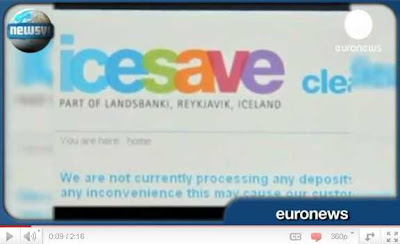Click on the linked picture above to go to a newsy.com video about Sony Corp.'s newest and biggest $3.2 billion loss for the financial year. You can also find the written transcript together with the video at [ http://www.newsy.com/videos/sony-reports-3-2b-loss/ ].
In fact, the last time Sony made any money was in 2008, making a loss for the first time ever in 2009 after markets plunged in late 2008. And the last time total sales were this low was in the last century! (SEE Sony Group Financial Information Historical Data.)
SOME EXTRA BACKGROUND:
The man in charge since 2005 is Howard Stringer - a Welsh-American heading Japan's iconic technology company. After some 30 years at American network giant CBS - rising from journalist ultimately to president in 1988 - Stringer was hired by Sony in 1997 to be the President of Sony Corp. of America.
The 90's is well known as the "lost decade" for Japan's economy. Large foreign rescue investors brought in their foreign CEOs. Ford brought Henry Wallace into Mazda in 1995. In 1999, Renault famously brought in Carlos Ghosn who turned Nissan around. However, Howard Stringer was brought in and promoted by Sony itself - as its self-administered rejuvenating medicine - and not by a foreign investor.
After Howard Stringer came in as President of Sony Corp. of America in 1997, Sony Corp's group performance continued to stumble and Stringer's career, at the age of 55, continued to rise ever swiftly. In 1999 he was given a place at the international Sony Corp. as a director, and in 2003 was made Vice-Chairman. Ultimately in 2005 Stringer cemented his position as Chairman and CEO - despite being reported to have given up on learning the Japanese language (and still until today only spending half his time in Japan)! Later in 2009, Stringer further absorbed the position of President into his responsibilities.
 |
| The President, Chairman, CEO and white knight savior for Sony Corp., Sir Howard Stringer and his... junior, shorter, executives |
Despite Stringer's late but stellar rise beyond his CBS-President career, Stringer has only had one year of outstanding results since taking over the helm in 2005 - that was in the 2007 financial year. Since then, as we know, Sony has fallen into a pit of ever widening losses.
With powerful and bright companies strongly competing against Sony in almost every product category - with the likes of Apple, Nintendo, Microsoft and Samsung - the future is a troubled one for Sony; even with their appointed skin-white-knight at its helm.
Some notes on the language:
The announcement of loss came as part of a regular report on accounting results. So let's take a look at some accounting vocabulary used:
net (sometimes spelled "nett") - "Sony suffered a $3.2 billion net loss" - In English, "net" has two main meanings.
The most common meaning of "net" is related to a web-like material - for example: used for catching fish. This is not the meaning here.
The opposite of the meaning of "net" used in the video is "gross". "Gross" is a larger whole total sum amount before considering any other amounts that you would like to deduct from this "gross" amount.
A "net" amount is the "gross" amount minus whatever deduction(s) you wish to deduct from that "gross". For example, your income minus your income tax can be called: "after tax income", "income after tax" or "income net of tax".
Much of modern accounting systems originates from Italy. The term used in Italian accounting, "netto", has the same meaning as the "net" in English. "Netto" originated from a Latin word that meant "cleaned, polished, shining" - so you can imagine a "net" amount as a "polished or cleaned" version of the "gross" amount!
 |
| We polish and clean off the layer of dirt from the crude or "gross" amount to give us the shining "net" amount. |
writeoff - "... Sony wrote off years worth of tax credits. The writeoffs are due to lowered profit expectations..." - A "writeoff", or to "write off" is an accounting term meaning to reduce the value of something, especially of an asset, often meaning to reduce the value to zero. The term comes from the physical act of writing amendments in accounts to take values off the accounts. In English, the term "writeoff" has been extended from accounting to assets such as real estate or vehicles (even if no accounting is involved) which have been destroyed such as to have almost zero value - the destroyed property can be termed "writeoffs".
 |
| To reduce the book value of an accounting item, usually assets, and often reduced to zero value: "writeoff" |
in the black - "Sony still expects the coming year to keep them in the black, despite the rash of bad news." - In accounting, the opposite of "in the black" is "in the red". In previous times (and perhaps still kept by some) red ink and black ink were used in accounting to write negative values and positive values respectively. Thus, in the Profit & Loss Account, a balance written in black would indicate a profit, and a balance written in red would indicate a loss. Another English idiom related to this is "red ink" to mean financial losses; for example, this headline from the New York Times: Insurer of Pensions Sees Flood of Red Ink.
 |
| In traditional accounting, a loss balance in the Profit & Loss A/c would be written in red ink. In this cartoon by Bill Day , from the political humor blog BartCop.com, presidential candidates McCain and Obama ponder the huge pool of American "red ink" that is the large national budget deficit left by outgoing President Bush. |
Practice your business English by watching and listening to the video above. For more detailed study, you can read the written transcript at the link given above.
Don't be scared if there is a lot that you don't understand. As long as you learn a little something new, then that is valuable: learning bit by bit is natural learning. By watching and listening, you will also be more exposed to, and more familiar with, various sentence structures and other language techniques used by English speakers.
I'll be happy to receive QUESTIONS and COMMENTS from English learners, and I'll try to answer your queries here about the language in this video. I look forward to your comments!
[A rare opportunity for you to speak, practice, chat and learn English especially for business, finance, law, international economies & trade at the webpage for Mastery English by clicking on the Advisor button below.]



























